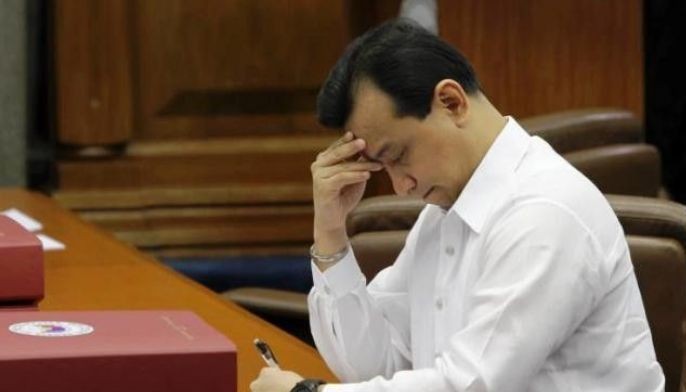COLUMN: OPINION ON PAGE ONE-Is DU30 set to make Sen. T. a major political player? by Francisco Tatad
WHILE President Duterte was visiting Israel earlier this week, Malacañang announced the revocation of a 2011 amnesty proclamation issued by his immediate predecessor B. S. Aquino 3rd, with the full concurrence of Congress, in favor of the political gadfly, Sen. Antonio Trillanes 4th, a former Navy lieutenant senior grade (equivalent to captain in the Army), who led the Oakwood Mutiny in Makati in July 2003, the Marines standoff in Taguig in February 2006, and the Manila Peninsula Hotel siege in Makati in November 2007 — all against former President Gloria Macapagal Arroyo, now Speaker.
A void proclamation
Proclamation 572 declared Aquino’s amnesty void ab initio allegedly because Trillanes got it under DND ad hoc committee resolution of January 11, 2011, without filing a formal application for it, and without pleading guilty for his offenses. DU30 then ordered the Department of Justice, whose newly appointed Secretary, Menardo I. Guevarra, he had named officer in charge of the entire government while he was traveling abroad, the Armed Forces of the Philippines and the Philippine National Police to pursue “all criminal and administrative cases” against the 47-year-old Trillanes. The DoJ was ordered to file criminal charges, while the AFP was ordered to prepare court martial proceedings against the former Navy lieutenant.
Trillanes, who has accused DU30 of having acquired so much hidden wealth, among other things, argued that the DU30 proclamation is without any constitutional or factual basis and therefore void. Under Article VII Section 19 of the Constitution, the President shall have the power to grant amnesty with the concurrence of a majority of all the members of Congress — and this is what happened in this case. One president’s exercise of this constitutional power is not subject to review by another president, except perhaps in the case of unmitigated and unconscionable abuse, in which case the amnesty might be reversed by a successor president with the concurrence of Congress, but never by the president by himself alone.
Cory’s edict
If a subsequent review by another president were allowed, then perhaps the amnesty granted by President Cory Aquino to all members of the Communist Party of the Philippines, New People’s Army, National Democratic Front who had been captured and jailed by Marcos during martial law might have been reviewed and revoked by any of her immediate successors, who thought that allowing the communists to resume their armed struggle was a big mistake. But no such thing happened.
As for certain factual allegations against Trillanes, the documentary evidence tends to show that, contrary to the allegation, he did, in fact, file a formal application for amnesty, and that he did, in fact, own up to his crimes. This shoots down the basis of DU30’s proclamation. Then the Regional Trial Court in Makati will not be able to issue a warrant of arrest and a hold departure order against him, and the AFP will have no legal basis to subject him to a court martial.
Trillanes lost his military status and rank when he ran for the Senate in 2007. Under the Omnibus Election Code one is deemed automatically resigned from whatever position one is holding upon filing a certificate of candidacy for any position, unless one is running for reelection. In 2007, Trillanes garnered 11.2 million votes as the 11th out of the 12 winning senators; in 2013, he was reelected with 14.1 million votes as the ninth of 12 newly elected senators. Therefore he can no longer be tried by a military court.
During martial law, under Marcos, a military tribunal tried the late former senator Benigno S. Aquino Jr. and meted him the death sentence, which Marcos refused to implement. The civil courts were not normally functioning then, and the case involved crimes against national security. We are not under martial law now. Even if we were, the new Constitution provides that a state of martial law does not supplant the functioning of civil courts or legislative assemblies, nor authorize the conferment of jurisdiction on military courts and agencies over civilians where civil courts are able to function.
Who decides?
Who will then decide whether DU30’s proclamation voiding Aquino’s 2011 amnesty proclamation ab initio is valid or not? It has no basis in the Constitution. The normal legal recourse then was to ask the Supreme Court to rule on the specific constitutional question. But this may no longer be the case. The latest public act by a simple majority of the high court (eight out of 15 justices) was to declare the 2012 appointment of their own chief justice Ma. Lourdes Sereno null and void ab initio, in total defiance of the Constitution, which does not give the court any power to review the validity of the President’s SC appointments, and provides that an impeachable official like the CJ, may be removed only through impeachment by Congress.
Sereno was removed through a quo warranto proceeding initiated by the Solicitor General. The petition demanded to know, after a period of four years, by what warrant or authority was she holding her official position? It was on its face an absurd petition since it was directed at an impeachable presidential appointee who was already facing an impeachment complaint in the House committee on justice, and it was initiated by an agent of the President himself who cannot lawfully impeach the validity of his own acts. It is equivalent to the left hand questioning what the right hand is doing. Sereno was nevertheless removed by her colleagues solely in obedience to DU30 who denounced her as his personal enemy and wanted her swiftly removed.
What then can anyone do to prevent the sitting justices headed by the new CJ Teresita de Castro from upholding DU30’s constitutionally flawed Proclamation 572 and any illegal action he may initiate against Trillanes? Assuming the SC justices were to adopt a contrary position, what can they possibly do to prevent DU30 from doing what he wants to do outside of the Constitution?
Senate protection
Against the threat of illegal arrest, Trillanes has sought the constitutional protection of the Senate. Under Article VI, Section 11 of the Constitution, “A senator or member of the House of Representatives shall, in all offenses punishable by not more than six years of imprisonment, be privileged from arrest while Congress is in session.” Members of the PNP Criminal Investigation and Detection Group (CIDG) surrounded the Senate building, poised to arrest Trillanes, but Senate President Vicente Sotto 3rd ordered the Senate sergeant at arms to prevent the police from carrying out any illegal arrest. Two police trucks or vans remain on standby outside the Senate building.
Behind Sotto’s action is a long parliamentary tradition. History records that on January 4, 1642, King Charles I entered the House of Commons in order to arrest five Members of Parliament for treason. All five had fled. The King took the Speaker’s chair and demanded that the Speaker produce them. The Speaker — William Lenthal — fell on his knees, and said, “May it please Your Majesty, I have neither eyes to see nor tongue to speak in this place but as this House is pleased to direct me whose servant I am; and humbly beg Your Majesty’s pardon that I cannot give any other answer than this to what Your Majesty is pleased to demand of me.”
Upon hearing this, the King left Parliament without arresting anyone. Since then no monarch has ever entered Parliament for the same purpose. Will DU30 stand down? Will he allow himself to be told that his proclamation is invalid, and that his desire to see Trillanes join Sen. Leila de Lima in jail has no legal basis? But this situation is time-bound. Since the Senate can shield Trillanes from possible arrest only for as long as Congress is in session, he will have to face DU30’s forces after that. He is now trying to get the courts to protect him from arrest through a temporary restraining order; but what happens if he does not get one?
In fact, some people are asking if DU30 would respect a TRO, assuming the high court would grant one, and allow Trillanes to travel. In 2010, the Aquino administration refused to allow the immediate past president, Mrs. Arroyo and her husband to travel despite a TRO issued by the high court in her favor. Then Justice Secretary (now detained senator) Leila de Lima gave specific instructions to the Bureau of Immigration not to allow the Arroyo couple to leave the country, even though at the time no formal charges of any kind had been filed against the former president.
By the end of June 2019, Trillanes will be termed out after two consecutive senatorial terms. He will have to run for another position in 2019 if he wants to continue in office, or he will have to let the 2019 election pass before he can run for the Senate again. Or he can run for a higher office in the 2022 presidential elections. He ran unsuccessfully for vice president in the 2016 elections.
Given the problems he must contend with between now and the end of his term in 2022, DU30 would most likely be getting rid of one big unnecessary headache if he lets Trillanes ride into the sunset while he tries to move on. But by going after Trillanes the way he is doing, DU30 has succeeded in raising him to the rank of a viable opposition leader. This is likely to become more pronounced if he succeeds in sending his nemesis back to jail-especially if the 2019 senatorial elections fail to produce a credible opposition leader for the next presidential elections.
Obviously DU30’s intention is to eliminate the former military rebel from the field of political competition. But that very effort, mishandled, could provide the platform for his emergence as a major political player.
 All photographs, news, editorials, opinions, information, data, others have been taken from the Internet ..aseanews.net | [email protected] |.For comments, Email to :D’Equalizer | [email protected] | Contributor
All photographs, news, editorials, opinions, information, data, others have been taken from the Internet ..aseanews.net | [email protected] |.For comments, Email to :D’Equalizer | [email protected] | Contributor









